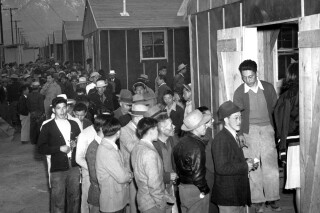Today in History: March 18, FDR signs executive order on internment of Japanese-Americans

In this March 24, 1942 file photo Japanese citizens wait in line for their assigned homes at an alien reception center in Manzanar, Calif. Many were forced from their homes in Los Angeles by the U.S. Army. (AP Photo, file)
Today in History:
On March 18, 1942, President Franklin D. Roosevelt signed an executive order authorizing the War Relocation Authority, which was put in charge of interning Japanese-Americans, with Milton S. Eisenhower (the younger brother of Dwight D. Eisenhower) as its director.
On this date:
In 1766, Britain repealed the Stamp Act of 1765.
In 1922, Mohandas K. Gandhi was sentenced in India to six years’ imprisonment for civil disobedience. (He was released after serving two years.)
In 1925, the Tri-State Tornado struck southeastern Missouri, southern Illinois and southwestern Indiana, resulting in some 700 deaths.
In 1937, in America’s worst school disaster, nearly 300 people, most of them children, were killed in a natural gas explosion at the New London Consolidated School in Rusk County, Texas.
In 1940, Adolf Hitler and Benito Mussolini met at the Brenner Pass, where the Italian dictator agreed to join Germany’s war against France and Britain.
In 1963, the U.S. Supreme Court, in Gideon v. Wainwright, ruled unanimously that state courts were required to provide legal counsel to criminal defendants who could not afford to hire an attorney on their own.
In 1965, the first spacewalk took place as Soviet cosmonaut Alexei Leonov went outside his Voskhod 2 capsule, secured by a tether.
In 1974, most of the Arab oil-producing nations ended their 5-month-old embargo against the United States that had been sparked by American support for Israel in the Yom Kippur War.
In 2002, Brittanie Cecil died two days short of her 14th birthday after being hit in the head by a puck at a game between the host Columbus Blue Jackets and Calgary Flames; it was apparently the first such fan fatality in NHL history.
In 2016, police in Brussels captured Europe’s most wanted fugitive, Salah Abdeslam, who was the prime suspect in the deadly 2015 Paris attacks.
In 2017, Chuck Berry, rock ’n’ roll’s founding guitar hero and storyteller behind such classics as “Johnny B. Goode,” “Sweet Little Sixteen” and “Roll Over Beethoven,” died at age 90.
In 2018, a self-driving Uber SUV struck and killed a pedestrian in suburban Phoenix in the first death involving a fully autonomous test vehicle; Uber suspended its autonomous vehicle testing program in Arizona, California, Pittsburgh and Toronto after the crash.
In 2020, the U.S. and Canada agreed to temporarily close their shared border to nonessential travel in the early days of the coronavirus pandemic.
In 2022, Vladimir Putin appeared at a huge flag-waving rally at a Moscow stadium Friday and lavished praise on his troops fighting in Ukraine, three weeks into the invasion that led to heavier-than-expected Russian losses on the battlefield and increasingly authoritarian rule.
